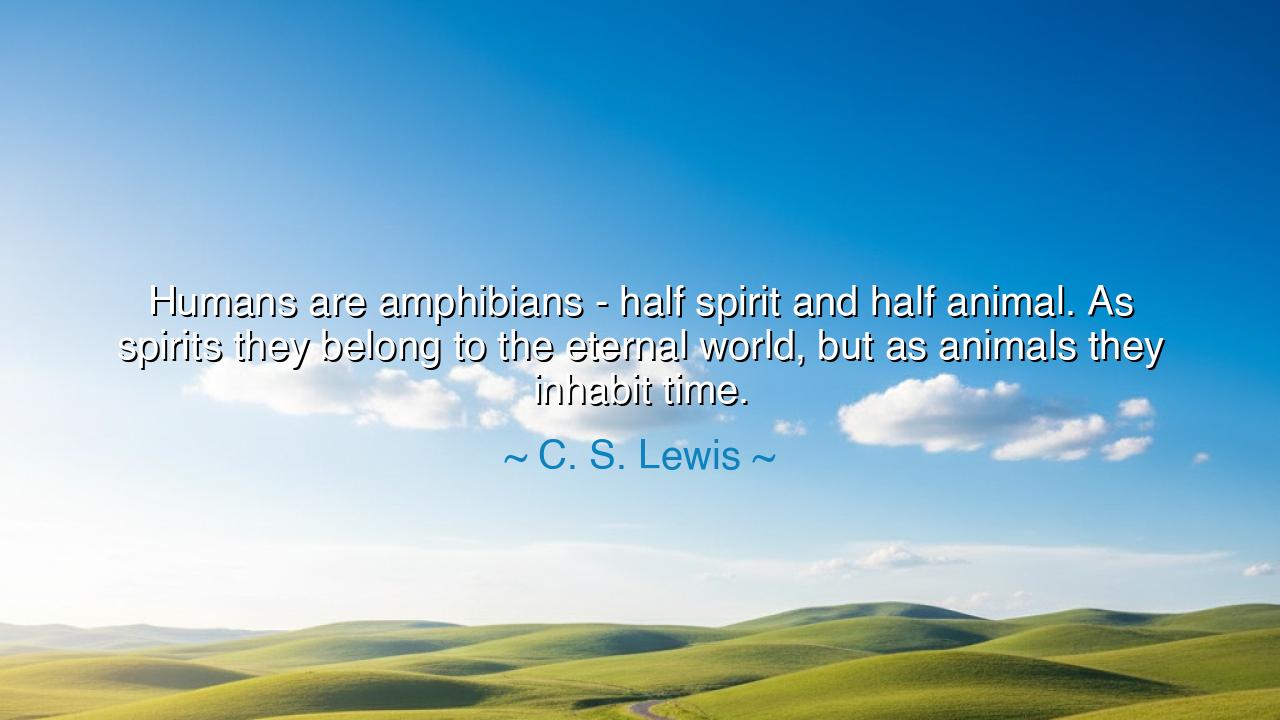
Humans are amphibians - half spirit and half animal. As spirits
Humans are amphibians - half spirit and half animal. As spirits they belong to the eternal world, but as animals they inhabit time.






The wise C. S. Lewis, that great thinker of the modern age who often clothed eternal truths in simple garments, declared: “Humans are amphibians—half spirit and half animal. As spirits they belong to the eternal world, but as animals they inhabit time.” With this saying, he revealed a mystery known to the ancients, yet often forgotten by those who are hurried and distracted. We are creatures of dual nature—bound to earth by flesh and bone, yet lifted toward heaven by the flame of spirit. To ignore either part is to live in blindness; to embrace both is to walk in the fullness of what it means to be human.
The animal within us is tied to the soil, to hunger, to the fleeting hours of the day. It wakes with the sun, tires with the dusk, and is shaped by desires, instincts, and fears. The spirit, however, belongs to what is timeless. It is drawn toward truth, beauty, and goodness—the eternal realities that neither rust nor decay. To live as a human being is to dwell in the tension between these two natures: one urging us to eat, drink, and grasp; the other calling us to contemplate, to worship, to love beyond ourselves.
The ancients understood this balance well. Consider the life of Marcus Aurelius, emperor of Rome. Surrounded by luxury, temptation, and the pressing demands of empire, his animal nature might have claimed him entirely. Yet through his meditations he reached toward his higher self, the spirit within. He wrote of self-discipline, of the fleeting nature of life, and of living in harmony with the eternal order. Though clothed in imperial robes, he bowed to the truth that man is more than appetite and power; he is also reason, conscience, and soul.
Yet Lewis also reminds us that these two natures are not enemies but companions. An amphibian does not reject either water or land, but learns to exist in both. So too must we learn to let the spirit guide the animal, and the animal give body to the spirit. Without the spirit, we fall into despair, chained to time, fearing death. Without the animal, we drift away from the responsibilities of this life, neglecting the duties of the present hour. True wisdom lies in harmony—when the eternal breath animates the temporal clay.
There is also warning here. For many live as though they were only animals, chasing after pleasures and fearing the end of days, forgetting they are destined for eternity. Others live as though they were only spirits, despising the body, ignoring the needs of others, and failing to act within time’s fleeting hours. Both extremes are ruin. The path of the noble is to remember always: you are both, and both must be honored.
The lesson for us is clear. When you feel the pull of earthly desire, remember that you are more than flesh; you are spirit, destined for eternity. And when you feel yourself drifting into dreams, forgetting the world, remember that you are also animal, bound by time, entrusted with daily tasks and sacred duties. Balance these truths as a warrior balances sword and shield.
Practical action lies in discipline: set aside time each day to feed the spirit—through prayer, meditation, or reflection on truth. And also care for the animal—by labor, by rest, by tending the body with health and dignity. Do not despise either half, for both are sacred, both are given, and both together make the wonder that is man.
Thus, children of tomorrow, walk with courage as amphibians of eternity and time. Let your spirit remind you of what lasts forever, and let your body remind you of the brevity of the hour. In this union, you will find strength, wisdom, and peace, and your life shall become a bridge between what is passing and what shall never pass away.






AAdministratorAdministrator
Welcome, honored guests. Please leave a comment, we will respond soon